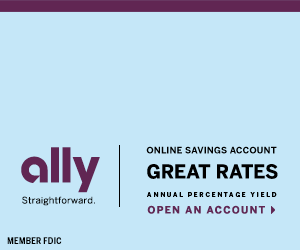Understanding the Benefits of Investing

There’s a lot more to investing than tying up major funds in order to one day purchase a home or retire in Aruba. It may not seem like it, but you make investment decisions every day. Buying new shoes—investment decision. Leaving your meager savings in a checking account rather than a high yield savings account
—investment decision. Spending $200 on Cinco de Mayo margaritas—investment decision (an enjoyable one, I might add). Truth be told, everything you do with your money is an investment decision—some just have the potential to bring you much larger returns.
Given the profusion of low-cost options available over the Internet, there has never been a better time to be a young investor. New, high-yield online savings accounts offer high returns (up to ten times higher than traditional savings accounts), zero risk, and complete liquidity. Exchange-traded funds (ETFs) give you the diversity of mutual funds, with low minimum investments. Many companies will make matching 401(k) contributions. Heck, buying stuff on eBay then turning around and re-selling it is even a kind of investment. Mutual funds, IRAs, and blue-chip stocks will definitely have a large place in your portfolio down the road, but for the time being, any prudent financial decision you make will have lasting benefits.
“Why should I invest?”
“More young Americans believe Elvis is alive than believe that they’ll ever see a Social Security check.” – John McCain
It seems like a valid question. What’s the fun in stashing away your hard-earned money in a robotic sounding 401(k) when you could be downing mojitos, strutting in Diesel jeans, or leasing a brand new Lexus instead? We’ve lived like serfs for four years in order to land jobs. Once the paychecks start rolling in, it’s our right to spend the money as we please.
Then again, “Why should I brush my teeth?” “Why should I wear pants to work?” and “Why should I put on this condom?” could all also be considered valid questions. The answer to the investment query—as with the other three—is not complicated. Although it may not be fun now, investing even small amounts while you’re young affords you the opportunity to one day own a home, live debt free, and guarantee that you won’t be greeting customers at Wal-Mart well into your seventies.
Not that all investing is about retirement. These days, leaving all your cash in a simple checking or savings account doesn’t make any sense. Online savings and trading accounts will earn you two to five times as much interest. It’s all about making your money work for you—the only trick is to choose the right bank account for your every day funds, as well. E-Trade’s on-line savings account consistently boasts some of the best interest rates available, and Scottrade’s $7 commissions on stock trades make investing affordable for everyone. There are a myriad of investment options out there (fear not, we’ve got you covered), so whether saving up for a laptop, BMW 3-Series, wedding, or cushy retirement, the same rules apply—start early, take advantage of compound interest, and maximize those returns.
“What’s so great about compound interest?”
“Compound interest is the eighth natural wonder of the world and the most powerful thing I have ever encountered.” – Albert Einstein
It’s tempting not to worry about retirement at your tender young age. I always applied this same logic to my English papers, and they turned out okay. Unfortunately, with Social Security’s seemingly imminent demise and the disappearance of pension-offering jobs, you should consider it your responsibility to foot your retirement bill. Once retired, you’ll need about 75 percent of your pre-retirement income to maintain a similar standard of living. This means that if you are making $150,000, retire at age 60, and live to be 90, you’ll need to have saved over $3,000,000. That probably seems like a lot, but you have the most important element of retirement savings on our side—youth. Find out exactly how much you’ll need here.
The sooner you start investing the better. If you invest $2,000 every year, starting right now at age 22, and earn an annual rate of return of 10 percent, by age 65 your $86,000 in investments will be worth over $1.5 million. If you wait until age 35 to start investing the same annual amount, your $60,000 will have turned into a paltry by comparison $360,000. Learn more about what your savings and investments will be worth here.
“Do I really have money to invest?”
“How can you become a successful investor? By making investing a part of your daily life.” – The Motley Fool
Irony of ironies—just at the time when investing benefits you the most, it’s the most difficult. Although you have graduated from college, you’re not exactly living like a king. Rent, car payments, and the modicum of fun you allow yourself on the weekends is hitting your bank account hard. And unlike student loan, credit card, and utility bill payments, transferring funds to an investment account is optional, and thus the first thing you tend to ignore.
It may seem difficult, but the truth is, you do have money to invest. If you’re able to contribute as little as $100 a month to an investment account, you’ll have a sizable portfolio in no time. Coming up with $100 a month is as easy as skipping the daily latte, buying regular gasoline instead of premium, and smoking less cannabis. Find even more savings tips here, many of which don’t involve curbing your drug use.
Most of you probably don’t like the idea of skimping on life’s luxuries, but just hear me out. That $3.50 mochachino probably doesn’t seem like a big expenditure, but it adds up. Skipping this daily treat would pocket you an extra $105 every month. Ten years of investing this amount in a brokerage account, earning an annual rate of return of 10 percent, will leave you with $21,000 to spend however you please. It gets better. Investing the same amount for 40 years in a Roth IRA would net you a cool $675,000 in tax-free retirement savings. That’s one expensive beverage.
By setting up an automatic deposit plan into your 401(k) at work, an IRA, or even a savings account, you can easily duplicate the preceding scenario. Check out our guide to 401(k)s and IRAs to learn more.
The thing to remember here is that we probably all have at least a little cash in various savings accounts, savings bonds from grandma, and retirement accounts at work. Taking the time to maximize the returns from these investment vehicles (or switching to more lucrative options) may involve investing a little time, but surely solidifying your financial future is worth it.






Comments
(3)I had no idea e-trade savings accounts offered 5.05% interest. Now that's something worth looking into. Oh and by the way, I'm never buying a 4 dollar coffee at Starbucks ever again.
The problem with "skimping" is that I already do skimp. I don't drink anything 'cept tap water, I have not bought groceries in over a month, have not driven/paid for gas in two months (car broke), I don't do drugs or smoke. I literally only pay my bills- cell phone, apartment, insurance, electric, water, college payments. And I still don't know how people come up with an extra 100 a month. I don't have any money left over after bills. I work 30 hours a week at my job, and I'm working 21 hours a week at my internship (unpaid). The internship is so that I can hopefully make more money in the long run, but right now it sucks. What would you recommend on investing/retirement for those who literally do not make enough to even buy a cup of coffee once a month, let alone invest 100.
@Andrea: The only other meaningful suggestion I can make to find funds for saving is to try to eek out a few extra dollars from your budget by making sure that you're not overpaying for any of your services (i.e., Have you consolidated your student debt to take advantage of a lower interest rate or to extend the number of payment periods and thereby decrease each monthly payment? Have you made sure there aren't any cheaper insurance plans with similar coverage? Etc.) However, as it sounds that you've been very prudent with your budget, I'm guessing you've already looked into this. Assuming that, now isn't the time to start worrying about saving. Saving should be an action you do to help ensure your financial future... but not at the expense of groceries! Instead, keep on doing what you're doing. It sounds like you're on the right track. Keep up with that internship to make you an even better job candidate for the next full-time job that you want to pursue that comes your way. Then, when you reach your next bump in pay, it will be time to reevaluate your budget to make room to purchase groceries, fix your car (assuming you need it and there isn't suitable public transportation available), and then see if you can begin to start putting $100, $50, or even $20 away each month. You'll definitely get there. PS: Have you at least considered an under $5 fund? Every bit helps!
POST YOUR COMMENT